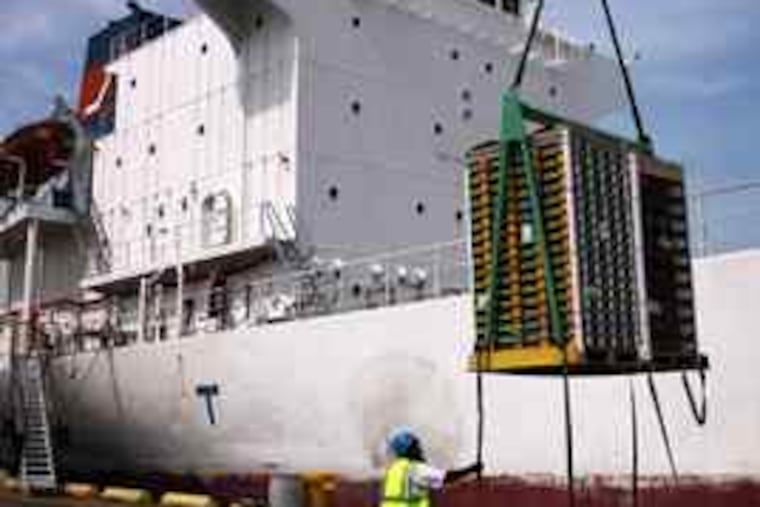20 percent more S. African fruit arriving this summer
South African citrus producers will ship 20 percent more fruit this summer to Gloucester Terminals L.C.C. on the Delaware River because, for the first time, some of the fruit is going by refrigerated rail to the West Coast.

South African citrus producers will ship 20 percent more fruit this summer to Gloucester Terminals L.C.C. on the Delaware River because, for the first time, some of the fruit is going by refrigerated rail to the West Coast.
The first navel oranges, clementines and grapefruit of South Africa's citrus season, now through mid-October, were unloaded Tuesday from the Tama Hope, docked south of the Walt Whitman Bridge. Stevedores went into the hatches to remove 2,800 pallets, each weighing about a ton.
Fresh fruit from Chile, Spain, Morocco and Argentina and bananas from the world's largest producers are a year-around business in the ports of Philadelphia, Wilmington, South Jersey, and Chester.
Fresh fruit accounts for about 25 percent of ship cargoes coming into the Delaware River. About 50 percent, excluding bananas, arrive from Chile in the winter.
Historically, South African citrus has been sold mainly east of the Mississippi River. But this year a consortium of 350 South African growers has arranged for a refrigerated rail company, Railex L.L.C., to transport about 30 percent of the fruit by train from Rotterdam, N.Y., to California and Washington State.
All South African fruit to the United States passes through Gloucester and has for more than a decade.
"It will be about 20 percent more citrus than was imported last year, another 5,000 pallets," said Marc Solomon, president and chief executive officer of Fisher Capespan, a large importer of South African citrus.
Railex will load the fruit onto Union Pacific trains - dubbed the Fruit Express - near Albany for the five-day journey west. On the sixth morning, the fruit will be available to supermarkets, restaurants, and wholesalers from San Diego north to Portland and Seattle, said Railex's vice president of corporate accounts, Bill Welker.
Railex makes the cross-country trip four times a week from west to east, and back. The trains depart Rotterdam, N.Y., on Tuesday and Thursday nights, with 55 rail cars, to Delano, Calif., and Pasco, Wash. "We take wine, orange juice, anything that's refrigerated and time sensitive," Welker said.
Why does so much fruit come here?
"Philadelphia is incredibly well-suited for the fresh fruit industry in terms of transportation, cold storage facilities, and U.S. Department of Agriculture facilities," Solomon said.
The region has extensive on-dock refrigerated warehouses and a network of inland cold-storage facilities accessible to shippers "that is unparalleled in the United States," said Leo Holt, whose family owns Gloucester Terminals and runs Packer Avenue Marine Terminal in South Philadelphia.
In Vineland, Hammonton and Glassboro, which cater to tomato, peach and blueberry growers, "there is lots of management and skilled labor who know how to handle fruit," Holt said. In nearby Kennett Square, there is temperature-controlled storage traditionally geared to the mushroom industry.
South African fruit exports, expected to be between $70 million to $80 million in 2010, will benefit the entire region because many who work on the piers in Gloucester live in South Philadelphia. Others live in South Jersey. "Likewise, the guys who work the container ships over at Packer Avenue live in South Jersey or Wilmington. It's a community," Holt said.
"The South African fruit for us fills in a lot of gaps in the slow season," said Jim McLaughlin, chief stevedore at the Gloucester terminal. "Summer is notoriously slow for general cargo. The South African fruit is a boost. It's more hours, particularly for longshoremen and truck drivers. It's a trickle-down thing."
The ships will arrive every 10 days from South Africa and "will keep people working who might not otherwise have opportunities," Holt said. "So it's a very important piece of business."